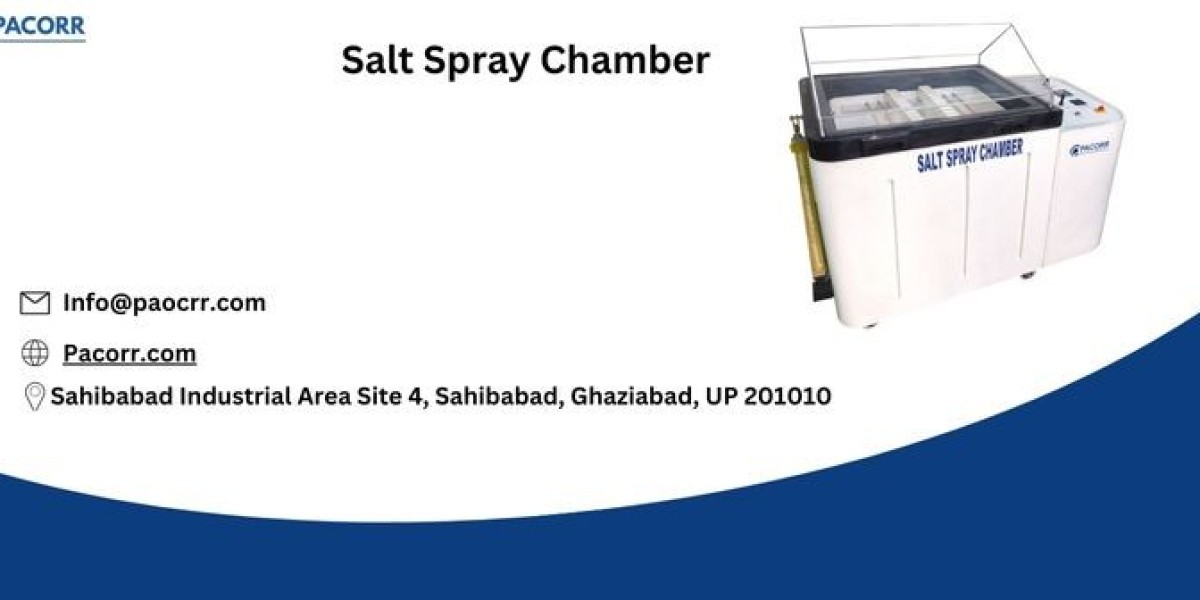Salt Spray Test Chamber, also known as salt fog test chambers, simulate corrosive conditions by spraying a saline solution onto test specimens. This accelerated testing method is essential for predicting how materials will perform in real-world environments, particularly those exposed to sea water or other corrosive elements.
What is a Salt Spray Test Chamber?
A Salt Spray Chamber is an enclosed apparatus that simulates a corrosive environment by atomizing a saline solution and spraying it onto test specimens. This accelerated testing method helps predict how materials will perform when exposed to real-world conditions over time. Industries such as automotive, aerospace, marine, and construction heavily rely on these tests to ensure the durability and integrity of their products.
Key Features of Pacorr's Salt Spray Test Chamber
Pacorr’s Salt Spray Test Chamber are equipped with advanced features to provide accurate and repeatable results:
1. Enclosed Chamber Design: Prevents contamination and ensures consistent test conditions.
2. Atomization System: Controls the size and intensity of the salt spray.
3. Temperature and Humidity Control: Maintains specific testing conditions for precise results.
4. pH Control: Ensures the salt solution remains within a specific pH range.
5. Safety Features: Includes automatic shut-off and ventilation systems.
6. Data Logging and Analysis: Records and analyzes test results for thorough insights.
7. User-Friendly Interface: Simplifies setup and operation, with some models offering remote control capabilities.
Types of Salt Spray Test Chamber
Traditional Salt Spray Chambers: Used for continuous salt spray tests as per ASTM B117 standards, evaluating the corrosion resistance of electroplated layers and anti-rust coatings.
Cyclic Corrosion Chambers (CASS Chambers): Perform tests under varying conditions of temperature and humidity, supporting ASTM G85 standards. These chambers are more aggressive and provide quicker results by including copper chloride.
Customized Testing Chambers: Tailored to replicate specific environmental conditions unique to particular industries or geographical areas .
Importance of Standards
Adherence to international standards like ASTM B117 and JIS 2371 ensures the reliability and consistency of corrosion tests. ASTM B117 outlines the conditions required for Salt Spray Chamber, including the preparation of the salt solution, chamber temperature, and test duration. JIS 2371 provides similar guidelines tailored to the Asian market, ensuring global applicability of the test results.
Applications Across Industries
Salt Spray Test Chamber are indispensable tools in various industries:
· Automotive: Ensuring that components can withstand harsh environments and maintain safety standards.
· Aerospace: Evaluating the durability of materials used in aircraft and spacecraft.
· Marine: Testing the corrosion resistance of equipment and structures exposed to sea water.
· Construction: Assessing the longevity of materials used in buildings and infrastructure.
Conclusion
Salt Spray Test Chamber are vital for assessing the corrosion resistance of materials and coatings, ensuring that products can withstand the test of time in harsh environments. Pacorr.com offers a range of advanced Salt Spray Chamber designed to meet the highest standards, providing industries with reliable tools to enhance product durability and safety. By investing in Pacorr's testing equipment, businesses can ensure their products meet global durability criteria, ultimately saving costs on maintenance and replacements due to corrosion failures.
FAQs about Salt Spray Test Chamber
1. What is a salt spray test chamber used for?
A Salt Spray Chamber is used to simulate corrosive environments and assess the durability and corrosion resistance of materials and coatings
2. What standards do Salt Spray Test Chamber follow?
Common standards include ASTM B117 and JIS 2371, which outline the conditions for salt spray testing, including solution preparation, temperature, and test duration
3. How does a salt spray test chamber work?
The chamber atomizes a saline solution and sprays it onto test specimens, simulating a corrosive environment to accelerate the corrosion process. The results help predict how materials will perform in real-world conditions
4. What are the benefits of using a salt spray test chamber?
Benefits include accelerated testing results, uniform testing conditions, and comprehensive data on material durability, helping industries improve product reliability and lifespan
5. What industries benefit from salt spray testing?
Industries such as automotive, aerospace, marine, and construction benefit from Salt Spray Chamber by ensuring their products can withstand corrosive environments and maintain safety and performance standards
For more detailed information on Pacorr’s Salt Spray Test Chamber and their extensive range of testing equipment, visit Pacorr.com






